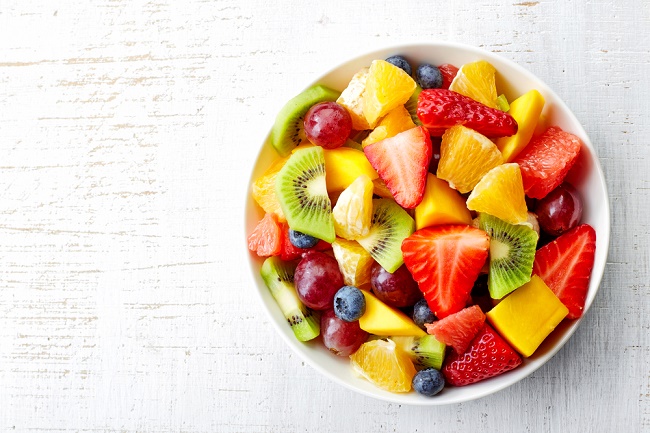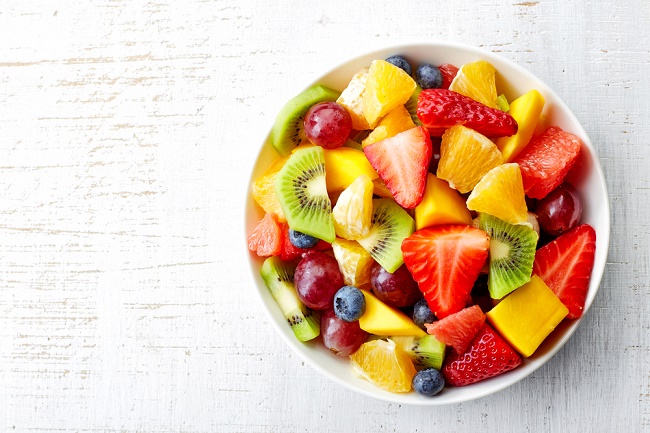Fruit salads are no less popular than vegetable salads. Easy serving and delicious taste make fruit salad a fun diet menu choice. Selection of types of fruit along with dressings right will improve even more benefit fruit saladso that not only more healthy to eatbut also better.
Besides being processed as juice, fruits are now popularly used as salads to get the benefits of vitamins and minerals in them. However, there are still many who have doubts because they think that fruits are not healthy enough because they contain sugar.

Fruit-BFruits Contain Lots of Fiber
Fat, protein, or carbohydrates can be digested and absorbed by the body, but fiber is different. Although it cannot be digested by the body, fiber actually brings good health benefits.
Fiber is divided into 2 types, namely soluble fiber and insoluble fiber. Soluble fiber is generally in the form of a gel. The benefits of this type of fiber include slowing the absorption of carbohydrates, increasing satiety, and lowering cholesterol and blood sugar levels. Many studies have shown that soluble fiber is also effective in losing weight.
While insoluble fiber is a type of fiber that will bind food in the digestive system to be excreted as feces. Not surprisingly, this fiber is good for people with constipation so that bowel movements can become smoother.
Fruit-BFruit is Rich in Nutrients and Prevents Disease
Taking the benefits of fruit salad is very important for the overall health of the body. Fruits are a natural source of fiber, vitamins, minerals and antioxidants. The following are the types of vitamins and minerals found in fruits and their benefits for the body:
1. Vitamin A
Vitamin A in fruit is useful for maintaining healthy eyes, body tissues, skin, and lowering the risk of prostate cancer. This vitamin also plays a role in maintaining endurance and bone growth.
2. Vitamin B1
Vitamin B1 is beneficial for healthy muscles, hair, skin, and nerves.
3. Vitamin B5
This vitamin plays a role in the formation of red blood cells, brain chemicals, and steroid hormones.
4. Vitamin B6
Vitamin B6 in fruit is useful in reducing the risk of heart disease, helps the formation of red blood cells, and affects appetite, mood, sleep, cognitive abilities, and immunity.
5. Vitamin C
This vitamin is useful in reducing the risk of cancer, helps the formation of collagen, strengthens the immune system, and acts as an antioxidant.
6. Vitamin E
Vitamin E is an antioxidant that plays a role in fighting free radicals and protecting cells from damage.
7. Potassium
Potassium is useful in lowering blood pressure, maintaining heart health, and is needed in muscle contraction.
8. Manganese
The benefits of manganese are to help metabolize amino acids, cholesterol, carbohydrates, and bone formation.
9. Folic acid
Folic acid plays an important role in reducing the risk of miscarriage and birth defects. In addition, these nutrients also play a role in making new body cells, preventing anemia, and maintaining general health.
The content of vitamins and minerals in fruit varies. You are advised to include various types of fruit in the fruit salad you eat so that the intake of vitamins and minerals obtained can be more diverse.
Moreover, various studies show that eating fruit is beneficial in preventing disease and reducing the risk of diseases, such as the risk of heart disease, type 2 diabetes, stroke, and high blood pressure.
Choosing the Right Type of Fruit for Serving the Right Fruit Salad
All types of fruit contain nutrients that are beneficial for the body. However, of course there are fruits that stand out more than the others. Serve the following fruits in your fruit salad menu to get maximum benefits and nutrients:
1. Apple
Apples are efficacious in lowering bad cholesterol and increasing good cholesterol. In addition, the antioxidant content of flavonoids in apples can also help reduce the risk of heart disease and stroke.
2. Pineapple
Pineapple is rich in vitamin C. One cup of pineapple is more than your daily vitamin C requirement. This fruit also contains substances that can help reduce inflammation.
3. Avocado
Avocados contain monounsaturated fats which are good for heart health. In addition, this fruit is also rich in potassium, manganese, and fiber.
4. Red and purple wine
Both types of grapes are rich in antioxidants and anti-inflammatory substances.
5. Pomegranate fruit
The antioxidant content in pomegranate is 3 times higher than green tea. Research shows that pomegranate is anti-inflammatory and can help reduce the risk of cancer.
6. Strawberries
Compared to other fruits, strawberries contain a low glycemic index. Eating strawberries does not make blood sugar rise. Strawberries are also high in antioxidants.
7. Mango
This tropical fruit that is found in Indonesia is rich in vitamin C, fiber, antioxidants, and anti-inflammatory substances. This fruit can also be a healthy snack option to increase energy and nutrition during daily activities.
8. Watermelon
Watermelon is rich in vitamins A and C. This fruit also contains lycopene which is useful in lowering blood pressure and cholesterol in the blood, as well as preventing cancer.
9. Orange
Oranges contain large amounts of vitamin C and potassium, and are a good source of B vitamins.
10. Guava
Consuming 30 grams of guava is enough to meet the needs of vitamin C per day. This fruit also contains vitamin A, fiber, potassium, manganese, copper, and folate.
11. Papaya
Papaya is known to be good for digestion. Papaya also contains vitamin C, vitamin A, folic acid, and potassium.
To take the benefits of fruit salad, it is not recommended to serve it with mayonnaise. Mayonnaise does make salads tastier, but dressings This supplement is high in fat and calories. The solution, replace mayonnaise with yogurt. Yogurt contains calcium and good bacteria that are good for digestion.
If you want to add sweetener, use a natural sweetener such as honey. Avoid added sweeteners, such as sugar, sweetened condensed milk, or syrup. The use of cheese as toppings also not recommended, because the fat content and high calories can reduce the benefits of fruit salad you want.











